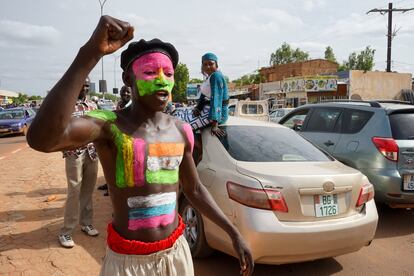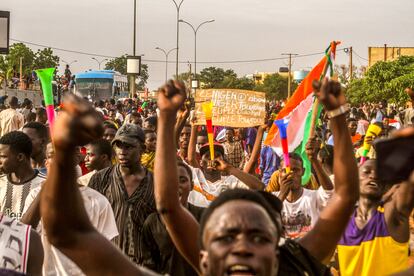Extreme poverty and terrorist violence fuel instability in the Sahel region
Niger was the last Western-allied democracy in this part of Africa. But now, with the recent coup, Russia has gained influence

Over the past decade, the Sahel region — the strip of land located south of the Sahara, which runs through Africa from east to west — has become one of the most inhospitable and unstable regions in the world. Against a backdrop of extreme poverty and climate change, the jihadist violence that erupted in Mali in 2012 has been spreading in the face of the inability of governments too weak to protect their own populations. As a result of this, recurring coups in the region’s nations have brought military regimes to power. Driven by a wave of anti-Western sentiment, these colonels, generals and captains have sought the support of Russia.
The recent military coup in Niger isn’t an isolated event. It has followed the pattern of its neighbors: Mali and Burkina Faso. With the difference that, on this occasion, the possibility of a regional conflict is closer than ever.
In the 1980s, Brazilian photographer Sebastião Salgado was already stunned by the hunger and poverty of the Sahel. He transferred his emotions and observations into a book, The End of the Road, which collected his black-and-white images of starving children and despair. That was 40 years ago, but since then, things haven’t improved. Now, there’s the added element of climate change, which translates into irregular rains and drought.
The misery of the Sahel — which in turn produces a strong feeling of injustice — fuels violence and instability, which have been spreading like an oil stain. This is despite the existence of natural resources that supply the Global North. The activity leaves few benefits for the local population.
“It’s the African paradox,” says Abdoulaye Mar Dieye, special coordinator for development in the Sahel at the United Nations. “This region is overflowing with gold, uranium and other precious metals, and yet, the poverty is tremendous. It’s a painful contradiction. Logically, the population is angry and wants a quick change. The slightest disturbing effect — such as the discontent of an army general — causes an explosion. The West has failed the Sahel: we haven’t invested enough. There’s cooperation and that’s fine, but we haven’t generated any transformation, there’s no employment, no infrastructure, no industry,” the diplomat laments. All the countries of the Sahel are among the 20 poorest in the world, according to the Human Development Index.
The jihadist insurgency — which has caused more than 30,000 deaths and four million refugees and displaced persons — feeds on this poverty and finds young followers, who feel as if they have no future. It began in northern Mali in 2012 and, by 2015, had spread to neighboring Burkina Faso and Niger. Neither the presence of a United Nations mission (MINUSMA) nor the creation of a regional military force (the G-5 of the Sahel), nor the robust French operation Barkhane — which saw almost 5,500 French troops on the ground — have been able to stop the terrorist advance. It has been carried out, above all, by the JNIM, which is dependent on Al-Qaeda and the Islamic State Sahel Province. Today, even countries further south — such as Benin, Togo or the Ivory Coast — are seriously threatened.
As during the four coups that shook Mali and Burkina Faso between 2020 and 2022, the military responsible for the uprising in Niger on July 26 cited insecurity as one of their main reasons for overthrowing the government of President Mohamed Bazoum. However, of the three states of the Sahel infiltrated by terrorism, Niger was the one that was best managing to confront it, thanks to a discreet but daring policy of dialogue with local communities and the reintegration of terrorists into society. “Bazoum had excellent vision — he was going in the right direction, but he has had to pay for old sins,” Dieye notes.
The underlying malaise is systemic. “It’s not the fault of democracy, nor of France, nor the West, China, Russia or anyone else,” affirms Gilles Yabi, head of the African think tank Wathi. “If we cannot have dignified attention in a ministry, maintain a minimum of cleanliness in public buildings, start a meeting without waiting one or two hours for a minister to arrive, or issue an administrative document to users without making them waste half-a-day. Only by working every day to transform the functioning of our states will we build the foundations of stability and prosperity. Of course, [this won’t be achieved] by having a new coup every year and making legitimately frustrated masses of young people — deprived of education, of perspectives and showered with false information and manipulations — believe that sovereignty and dignity are won with slogans.”

For the first time in this long series of coups, the Economic Community of West African States (ECOWAS) has gone beyond economic sanctions and has decided to wield the threat of military intervention. “Niger is the last drop in the bucket. If we allow the coup plotters to take power, no democratic government will be safe in the region. It was necessary to send a message of firmness, of an end to impunity. We continue to think that showing our teeth can work, but the military junta is closed to dialogue and puts us in a very difficult position. Pulling out the stick and not using it would totally discredit us,” an African diplomat emphasizes.
Until July 26, Niger was the best ally of the West and the European Union in the central Sahel. The nation’s collaboration on defense and security matters — with U.S. and French bases on their soil — and cooperation on immigration control bolstered its standing. In addition to this collaborative relationship, Niger has uranium: key to keeping nuclear power plants running. The country has the largest reserves of this raw element and is the main supplier of the EU, specifically France. A few hours after taking power, the coup leaders announced the suspension of these exports. But the truth is that the uranium — extracted by the French company Orano — has continued to flow out of the country. The Western atomic energy industry has a special interest in Niger remaining an ally, to ensure that these reserves aren’t exploited by other countries, such as Russia.
The shadow of Moscow has hung over the instability of the Sahel, ever since the Malian military junta decided to break its ties with France and hire Wagner’s mercenaries as new partners in the fight against terrorism. Yevgeny Prigozhin’s men — already present in the Central African Republic, Libya and Mozambique — arrived in Mali at the end of 2021. They’ve occupied the space vacated by the French Barkhane operation, which was expelled from the country by the military junta. In neighboring Burkina Faso, meanwhile, the ruling military has not brought the Wagner Group in, but has strengthened its military ties with Russia. The fear now, prevalent in Western foreign ministries, is that Niger will also fall into the orbit of Vladimir Putin, as shown by the first gestures of the coup leaders and the Russian flags that have appeared in the pro-junta demonstrations.
Faced with the military intervention of ECOWAS — led by troops from Nigeria, Senegal and the Ivory Coast — the two military regimes that govern Burkina Faso and Mali have already announced their support for the coup plotters in Niger. The possibility of the region being split in two and a war between armies being waged is closer than ever. “The military option is the worst of all options,” Dieye concludes, “because it will not destabilize just the Sahel, but all of Africa and the world. In the event of a conflict, a large wave of migration to Europe is to be expected.”
Sign up for our weekly newsletter to get more English-language news coverage from EL PAÍS USA Edition
Tu suscripción se está usando en otro dispositivo
¿Quieres añadir otro usuario a tu suscripción?
Si continúas leyendo en este dispositivo, no se podrá leer en el otro.
FlechaTu suscripción se está usando en otro dispositivo y solo puedes acceder a EL PAÍS desde un dispositivo a la vez.
Si quieres compartir tu cuenta, cambia tu suscripción a la modalidad Premium, así podrás añadir otro usuario. Cada uno accederá con su propia cuenta de email, lo que os permitirá personalizar vuestra experiencia en EL PAÍS.
¿Tienes una suscripción de empresa? Accede aquí para contratar más cuentas.
En el caso de no saber quién está usando tu cuenta, te recomendamos cambiar tu contraseña aquí.
Si decides continuar compartiendo tu cuenta, este mensaje se mostrará en tu dispositivo y en el de la otra persona que está usando tu cuenta de forma indefinida, afectando a tu experiencia de lectura. Puedes consultar aquí los términos y condiciones de la suscripción digital.









































